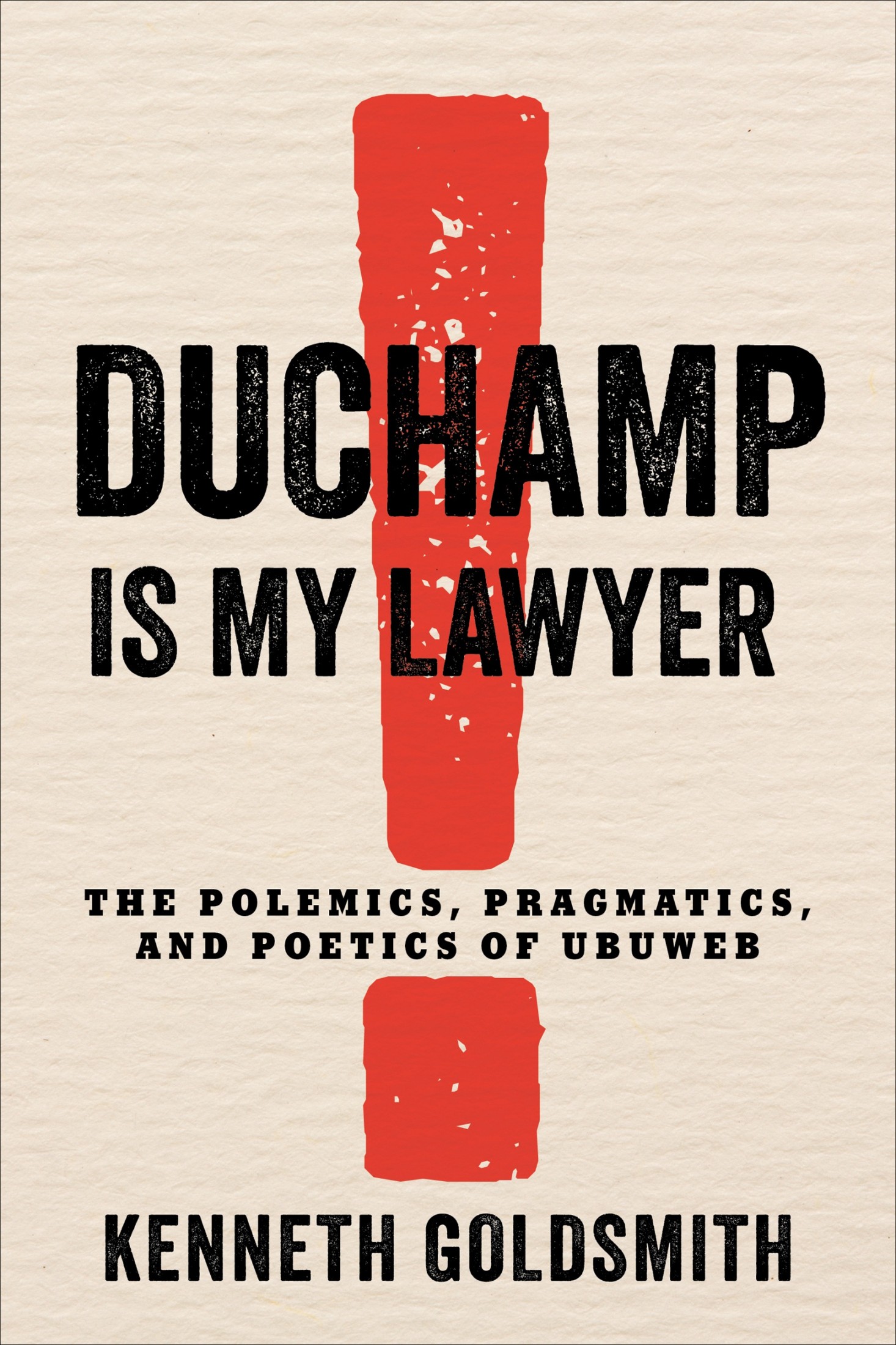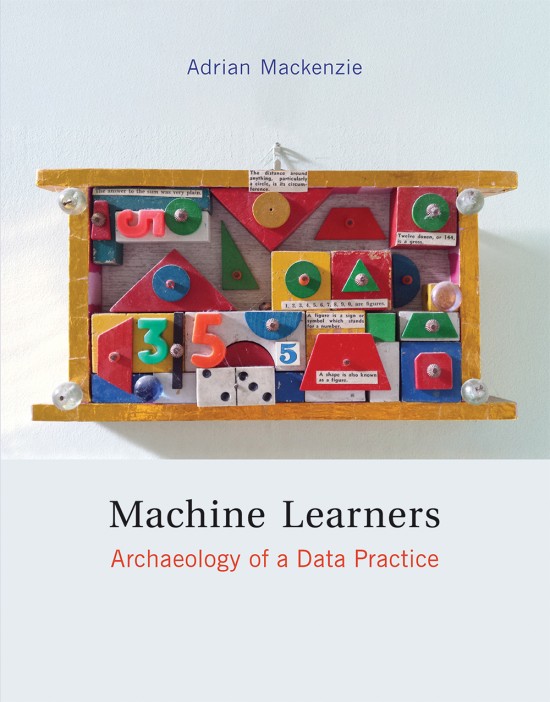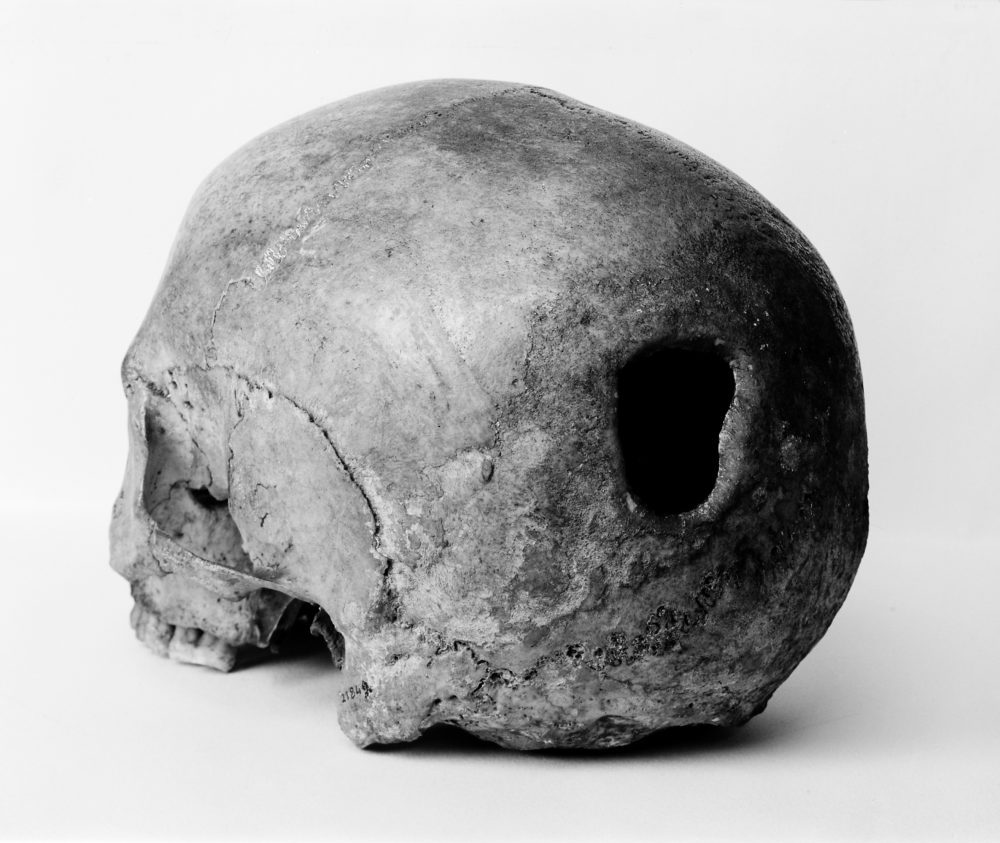Kenneth Goldsmith: Duchamp Is My Lawyer: The Polemics, Pragmatics, and Poetics of UbuWeb (2020)
Filed under book | Tags: · abstraction, algorithm, appropriation, avant-garde, collage, conceptual writing, concrete poetry, copyright, digital library, digitisation, language, modernism, noise, piracy, shadow library, sound poetry, ubuweb, video art, visual poetry

“In 1996, during the relatively early days of the web, Kenneth Goldsmith created UbuWeb to post hard-to-find works of concrete poetry. What started out as a site to share works from a relatively obscure literary movement grew into an essential archive of twentieth- and twenty-first-century avant-garde and experimental literature, film, and music. Visitors around the world now have access to both obscure and canonical works, from artists such as Kara Walker, Yoko Ono, Pauline Oliveros, Samuel Beckett, Marcel Duchamp, Cecil Taylor, Glenn Ligon, William Burroughs, and Jean-Luc Godard.
In Duchamp Is My Lawyer, Goldsmith tells the history of UbuWeb, explaining the motivations behind its creation and how artistic works are archived, consumed, and distributed online. Based on his own experiences and interviews with a variety of experts, Goldsmith describes how the site navigates issues of copyright and the ways that UbuWeb challenges familiar configurations and histories of the avant-garde. The book also portrays the growth of other “shadow libraries” and includes a section on the artists whose works reflect the aims, aesthetics, and ethos of UbuWeb. Goldsmith concludes by contrasting UbuWeb’s commitment to the free-culture movement and giving access to a wide range of artistic works with today’s gatekeepers of algorithmic culture, such as Netflix, Amazon, and Spotify.”
Publisher Columbia University Press, New York, 2020
ISBN 9780231186940, 0231186940
x+318 pages
Reviews: Raphael Rubinstein (Art in America, 2020), Jan Baetens (Leonardo, 2020), Mark Athitakis (On the Seawall, 2020), Nick Soulsby (PopMatters, 2020), Alexander Adams (2020), Tomáš Hudák (3/4, 2020, SK), Cécile Marie-Castanet (Critique d’art, 2020, FR), Georg Fischer (iRights.info, 2020, DE), Gill Partington (London Review of Books, 2021), Daniel Morris (Williams Review, 2021), Andrew S. Taylor (American Book Review, 2022), Roi Tartakovsky (Common Knowledge, 2023).
HTML (added on 2020-6-23)
EPUB (11 MB, updated on 2020-6-24)
Adrian Mackenzie: Machine Learners: Archaeology of a Data Practice (2017)
Filed under book | Tags: · abstraction, algorithm, archaeology, artificial intelligence, code, data, diagram, error, information science, information theory, knowledge, machine learning, mathematics, neural networks, programming, theory

“If machine learning transforms the nature of knowledge, does it also transform the practice of critical thought?
Machine learning—programming computers to learn from data—has spread across scientific disciplines, media, entertainment, and government. Medical research, autonomous vehicles, credit transaction processing, computer gaming, recommendation systems, finance, surveillance, and robotics use machine learning. Machine learning devices (sometimes understood as scientific models, sometimes as operational algorithms) anchor the field of data science. They have also become mundane mechanisms deeply embedded in a variety of systems and gadgets. In contexts from the everyday to the esoteric, machine learning is said to transform the nature of knowledge. In this book, Adrian Mackenzie investigates whether machine learning also transforms the practice of critical thinking.
Mackenzie focuses on machine learners—either humans and machines or human-machine relations—situated among settings, data, and devices. The settings range from fMRI to Facebook; the data anything from cat images to DNA sequences; the devices include neural networks, support vector machines, and decision trees. He examines specific learning algorithms—writing code and writing about code—and develops an archaeology of operations that, following Foucault, views machine learning as a form of knowledge production and a strategy of power. Exploring layers of abstraction, data infrastructures, coding practices, diagrams, mathematical formalisms, and the social organization of machine learning, Mackenzie traces the mostly invisible architecture of one of the central zones of contemporary technological cultures.
Mackenzie’s account of machine learning locates places in which a sense of agency can take root. His archaeology of the operational formation of machine learning does not unearth the footprint of a strategic monolith but reveals the local tributaries of force that feed into the generalization and plurality of the field.”
Publisher MIT Press, November 2017
ISBN 9780262036825, 0262036827
272 pages
via A.B.
Review: Graham White (Computational Culture, 2021)
PDF (removed on 2018-8-20 upon request from publisher)
Draft and code samples on GIT
Glass Bead, 2: Site 1: Logic Gate, the Politics of the Artifactual Mind (2017) [English/French]
Filed under journal | Tags: · abstraction, artificial intelligence, inhuman, logic, machine, mind, theory

“The first issue of the journal was dedicated to repositioning art in the landscape of reason. This issue is focused on the fabric of reason itself, and the ways in which it is currently altered by the emergence of artificial intelligence.
While the capacities of thought are being externalized in machines that increasingly mirror human intelligence, the question of the technical artifactuality of mind and its political ramifications becomes particularly pressing.
For us, far from being limited to the computational instantiation of intelligence, understanding the politics of these developments in artificial intelligence requires acknowledging that mind has always been artifactual.
Site 1: Logic Gate, the Politics of the Artifactual Mind proposes to explore the formal, philosophical and scientific dimensions of this question, so as to consider the role art might play in the lucid unfolding of its possibilities.”
With contributions by Danielle Macbeth, Gary Tomlinson, Matt Hare, Ben Woodard, Nina Power, Matteo Pasquinelli, Benjamin Bratton, Nora Khan, Hito Steyerl, Ian Cheng, Catarina Dutilh Novaes, Reviel Netz, Peli Grietzer, Lee Gamble, Dhanveer Singh Brar, T’ai Smith, and James Trafford.
Edited by Fabien Giraud, Jeremy Lecomte, Vincent Normand, Ida Soulard, and Inigo Wilkins
Publisher Glass Bead, November 2017
HTML, PDFs (English)
HTML, PDFs (French)
See also Issue 1

